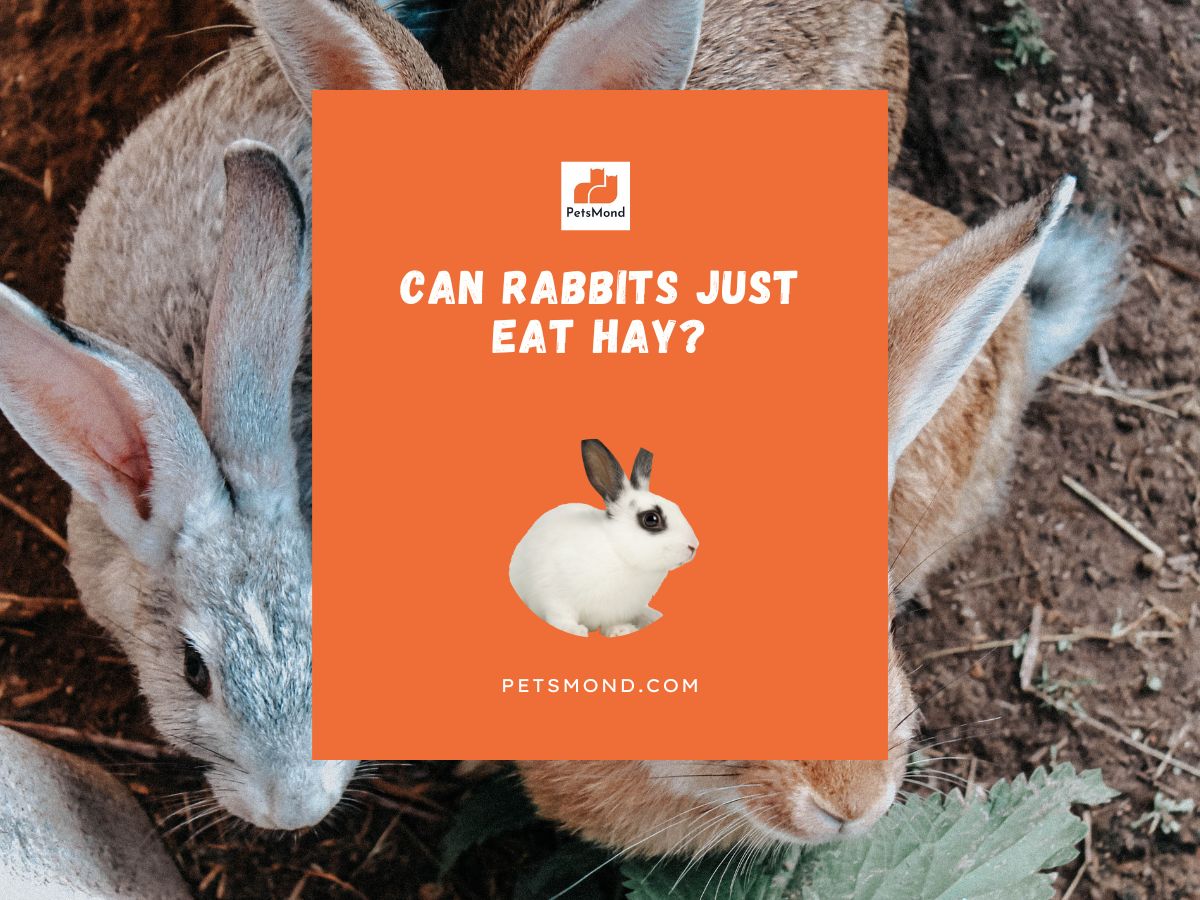I’ve raised several rabbits in the last decade. Whenever someone visits our home, they quickly find out that we’ve a rabbit with traces of hay around. In fact, some aspiring rabbit parents asked if rabbits eat just hay as they assumed that it’d make their lives easier if they procured hay in bulk. But, the reality is different. If you’re wondering whether rabbits can just eat hay, here you go!
Hay should make up the majority (80-90%) of a rabbit’s diet, with fresh vegetables and light treats reserved for occasional snacks. Not only does hay provide critical nutrition, but rabbits also need to engage in hay-chewing to keep their teeth from becoming over-long.
There’s more to the concept of feeding hay to rabbits. Did you know that it can take a toll on their health conditions as well? However, that only means a balanced diet. What should you do? What’s the truth behind it? Let’s take a broader look at key elements in this article.
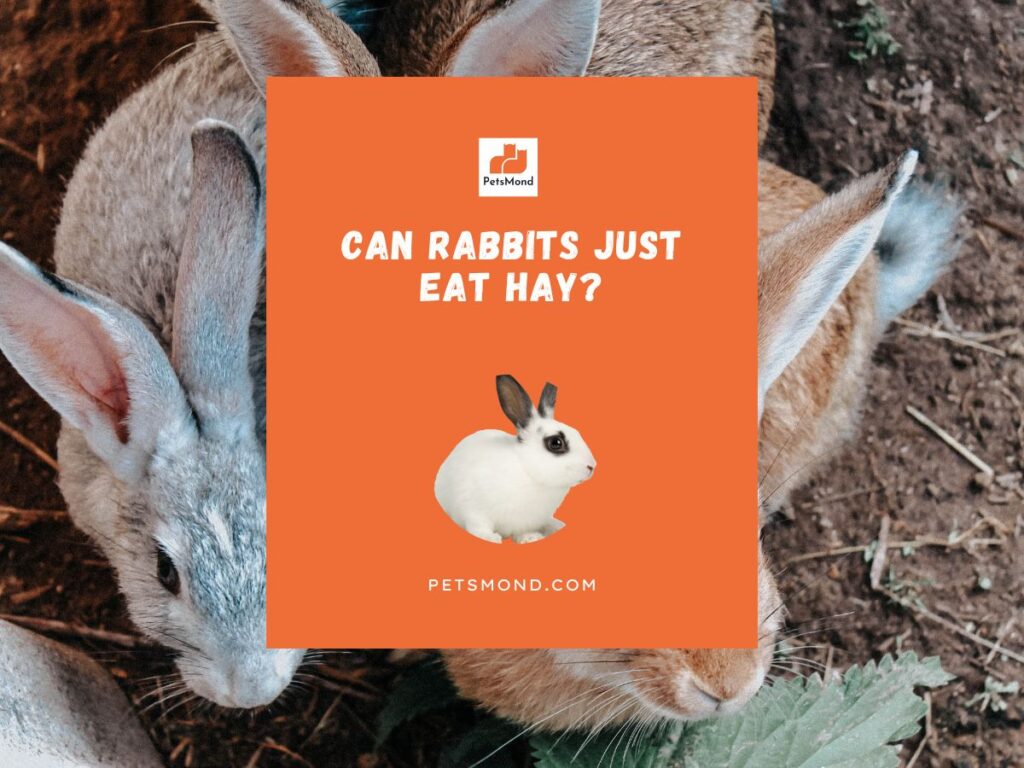
Nutrients in Hay
Hay contains many kinds of protein, vitamins A and E, phosphorus, magnesium and potassium that rabbits need daily to sustain life. The fiber content in hay makes it a natural laxative, helping to regulate digestion and ease digestive disorders. The Veterinary Nurse considers hay as an appropriate feed highly useful for rabbits.
Hay can also help prevent obesity due to its low-calorie content. For animals such as cows, goats and horses, hay provides them with essential nutrients for growth, vitality and overall health. Moreover, hay’s slow-burning properties make it an ideal choice for the winter months, when there is an increased need for energy. As such, hay is a tremendous asset for nutrition across all species.
A research article published by the Journal of Exotic Pet Medicine highlights hay as a regulator for rabbits to munch whatever feed that’s required. As a result, it alerts your rabbit and avoids underfeeding or overfeeding at any cost.
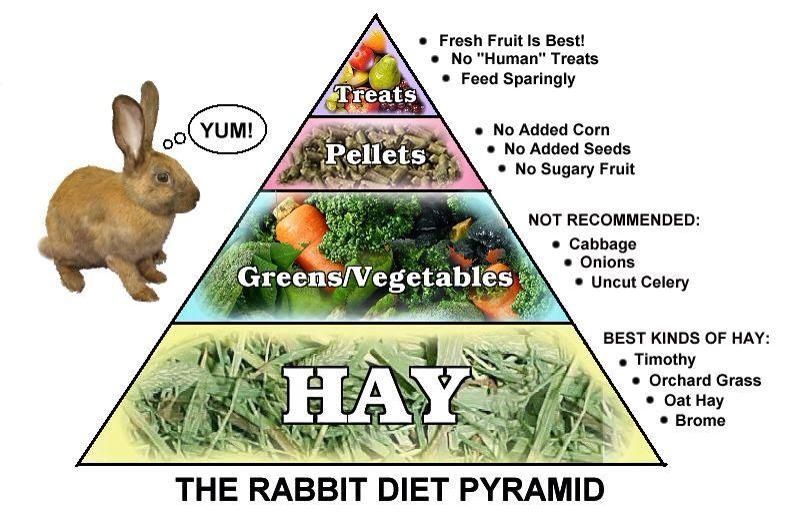
Types of Hay For Rabbits
A crucial part of a rabbit’s diet is hay, which provides essential fiber and nutrients. But with so many types of hay available, it can be challenging to determine which one is best for your rabbit.
Only after a year’s raising of a rabbit, I recognized that there are other types of hay. And then, weeks of research went on the right type of hay. So, you aren’t alone!
In this section, we’ll go over the different types of hay for rabbits and what makes each one unique.
Timothy Hay
Timothy hay is the most popular type of hay fed to rabbits and other small pets. It provides the proper nutritional content and nutrients that rabbits need and has high fiber content. The most commonly fed timothy hay is second cut. This cut is softer and more palatable for rabbits, making it easier for them to digest. However, note that different cuts of timothy hay affect the nutrition, so it’s essential to choose the right one for your rabbit’s needs.
Orchard Grass
Orchard grass is another popular hay for rabbits. It’s high in fiber and low in protein, making it an excellent choice for rabbits who need to maintain a healthy weight. Orchard grass is also a good source of vitamins and minerals, including calcium, which is essential for strong bones. Note that orchard grass can be a bit tough, so it may not be the best choice for rabbits with dental issues.
Alfalfa Hay
Alfalfa hay is a legume hay that is high in protein and calcium. It’s an excellent choice for young rabbits who need extra nutrients to support their growth. However, note that alfalfa hay should be avoided for adult rabbits, as the high protein and calcium content can lead to health problems such as bladder stones.
Oat Hay
Oat hay is a type of hay that includes oat, wheat, and barley. It’s rich in vitamins, fiber, and other minerals and low in protein. Many rabbits enjoy the crunchiness of the seed husks, and you will see it blended with other hays. Oat hay is an excellent option for rabbits who need to maintain a healthy weight as it’s low in protein and calories.
Bermuda Grass
Bermuda grass is a warm-season grass that is high in fiber and low in protein. It’s a good choice for rabbits with digestive issues as it’s easy to digest. However, note that Bermuda grass can be tough and may not be the best choice for rabbits with dental issues. Additionally, Bermuda grass can be high in calcium, which can lead to health problems such as bladder stones if fed in excess.
Tip: When choosing a hay for your rabbit, consider your rabbit’s age, weight, and any health issues they may have.
Looking for a TL;DR version of types of hay for rabbits?
Here’s a table summarizing the nutritional content of each type of hay:
| Hay Type | Protein Content | Calcium Content | Fiber Content |
|---|---|---|---|
| Timothy Hay | Low | Low | High |
| Orchard Grass | Low | High | High |
| Alfalfa Hay | High | High | High |
| Oat Hay | Low | Low | High |
| Bermuda Grass | Low | High | High |
Pros & Cons Of Hay For Rabbits
It’s totally understandable to lack an understanding of the usefulness and effectiveness of hay for rabbits. One of my rabbits, Winky, never ate hay for months together and that’s when I had to alter the diet pattern. On the other hand, my present bunch of little bunnies love hay.
Hay is an essential part of a rabbit’s diet, but not all hay is created equal, as rightly mentioned by a research study in Veterinary Nursing Journal. Here are some pros and cons of feeding hay to your bunny:
Pros:
- Nutrition: Hay is rich in fiber, which is essential for a rabbit’s digestive health. It also provides other important nutrients that rabbits need to stay healthy.
- Teeth health: Rabbits’ teeth never stop growing, so they need to constantly chew on something to keep them in check. Hay is the perfect solution, as it’s tough enough to wear down their teeth without causing any damage.
- Foraging: Rabbits are natural foragers, and hay provides them with the opportunity to engage in this behavior in a safe and healthy way.
- Variety: There are many different types of hay available, so you can choose the one that’s best for your rabbit’s needs. Timothy hay is the most commonly recommended type, but there are other options like orchard grass, oat hay, and more.
Cons:
- Calcium content: Some types of hay, like alfalfa hay, are high in calcium, which can be harmful to rabbits in large quantities. Be sure to choose a hay with an appropriate calcium content for your bunny’s age and health needs.
- Taste: Not all rabbits love the taste of hay, so it may take some trial and error to find a type that your bunny enjoys.
- Dust and mold: Hay can sometimes be dusty or moldy, which can be harmful to rabbits with respiratory issues. Be sure to inspect your hay carefully before feeding it to your bunny.
- Cost: High-quality hay can be expensive, especially if you have a large rabbit or multiple bunnies to feed.
To make sure you’re choosing the right hay for your bunny, consider consulting with a veterinarian or doing some research on your own.
Here’s a video that makes it clear that sufficient consumption of hay implies proper poop:
| Pros | Cons |
|---|---|
| Provides essential nutrients like fiber and protein | Some types (like alfalfa) are high in calcium, which can be harmful in large quantities |
| Helps keep rabbits’ teeth healthy and worn down | Not all rabbits enjoy the taste of hay |
| Encourages natural foraging behavior | Hay can sometimes be dusty or moldy, which can be harmful to rabbits with respiratory issues |
| Comes in many different varieties to suit different needs | High-quality hay can be expensive, especially for larger rabbits or multiple bunnies |
| Can be used as a bedding material for added comfort |
Note: Always inspect it carefully for signs of mold or dust before feeding.
Caution: While poor quality hay should be avoided, if you intend to feed your bunny hay, it is important to get hay from untouched green pastures and mold-free fields so as not to expose them to harmful toxins.
Can Rabbits Just Eat Timothy Hay?
Rabbits can certainly eat just Timothy hay as their primary diet, but their meals should still be supplemented with other items. Timothy hay is a great source of fiber and roughage for rabbits, helping to keep their digestive systems healthy and active.
Due to high fiber and low protein levels, Vancouver Rabbit Rescue and Advocacy recommend considering Timothy hay as a free-choice, implying that it should be available at all times.
But, Timothy hay still lacks the protein and fiber that are required for consistent growth of a rabbit. This makes Alfalfa an add-on as a treat to rabbits.
If you opt to feed your rabbit only Timothy hay as their main food source, then you should add a small amount of Alfalfa or other fresh vegetables or fruits for balance.
Check out this article: Safe & Unsafe fruits for rabbits
Additionally, always ensure that fresh, clean water is available at all times.
If your rabbit isn’t drinking water, check this article: How to tell if a rabbit is dehydrated?
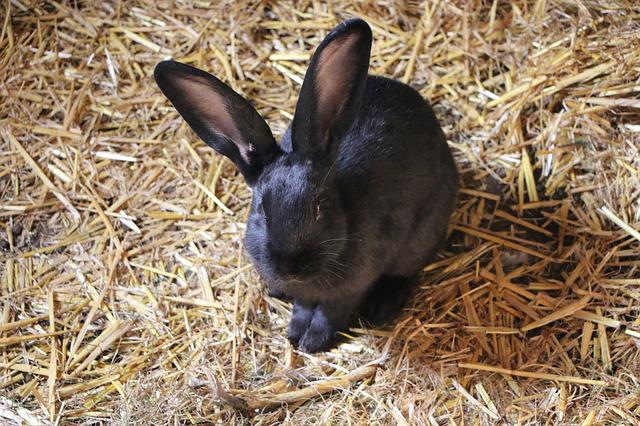
Why My Rabbit Doesn’t Eat Hay?
A rabbit may not eat hay for a variety of reasons, including boredom, need for flavor, dental issues, gastrointestinal upset, or probably new to eating hay. Rework the feeding routine and the diet given. If the problem persists, you should check if your rabbit is experiencing troubles in the digestive system.
In a book authored by A McBride, it’s identified that a rabbit needs flavors and changes in diet patterns regularly or they get picky.
A good way to help encourage your rabbit to eat hay is by adding herbs or other flavorful additions like dried fruit or unsweetened cereal.
Introducing a variety of fresh vegetables into the diet can help as well, as they provide an interesting flavor change from the hay while also providing essential vitamins and minerals.
What Happens If A Rabbit Doesn’t Eat Hay?
Without hay in their diet, rabbits are at risk of developing painful medical conditions such as malocclusion, where the jaws don’t line up correctly, or dental spurs, which can restrict eating and make it difficult for a rabbit to stay nourished. Alternatively, they can develop gastrointestinal upsets leaving the digestive system at stake.
A diet without hay can have serious consequences for our furry friends. Rabbits require a high-fiber diet, with hay making up around 80% of their total food intake. This is not just to promote digestion, but also to keep their teeth healthy and growing properly. Also, a lot of rabbit owners shared how rabbits are prone to gastrointestinal (GI) stasis when they fail to eat hay.
Further, you should also check if you’re feeding the right type of hay. Veterinary Center for Birds & Exotics highlights that rabbits are choosy about the type and they’re well-aware of their needs. Hence, the wrong type of hay can probably deter them from eating it.
Note: Ensuring your rabbit has access to plenty of hay is essential for its physical well-being as well as its mental stimulation so they can live a long, healthy life.
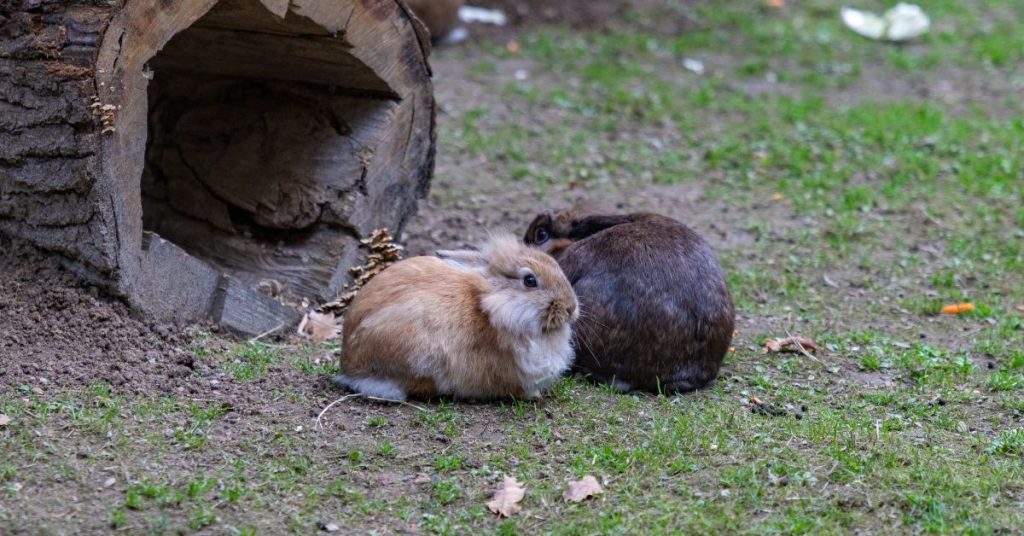
How Do I Know If My Rabbit Is Eating Enough Rabbit Hay?
Your rabbit is eating enough rabbit hay if these signs are evident – well-aligned teeth, luster in fur, regular fecal pellets, easy digestion, and normal appetite. When one of these is dropping, it’s an indicator that the hay consumption is less and/or your rabbit is prone to a health complication.
In another research article, it’s evident that the growth of incisor and cheek teeth is high when the consumption of hay is low.
As soon as you find your rabbit hesitating to consume enough rabbit hay, it’s a red alert. I’d suggest a thorough health check and change the diet by adding a bit of flavor. Of course, it’d work!
Also read:


